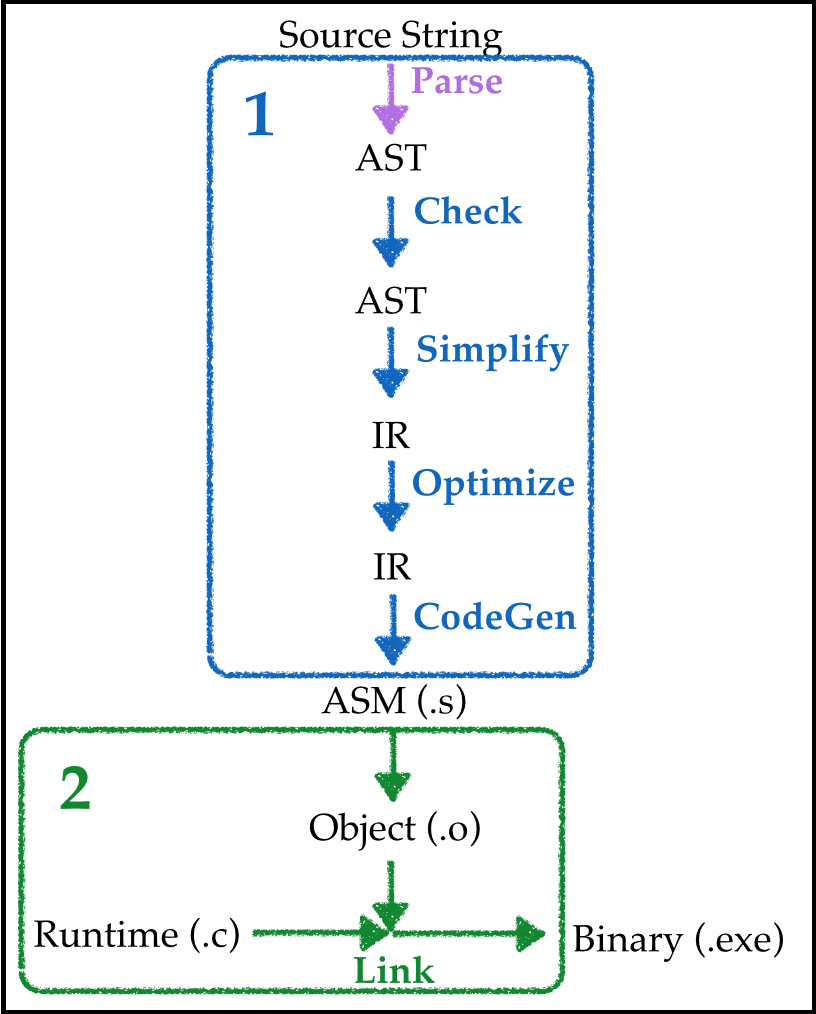Adding Garbage Collection to the Runtime

QUIZ: Tuples on the Heap
Using the above “library” we can write code like:
def tup4(x1, x2, x3, x4):
(x1, (x2, (x3, (x4, false))))
def get(e, i):
if (i == 0):
head(e)
else:
get(tail(e), i-1)
let quad = tup4(1, 2, 3, 4) in
get(quad, 0) + get(quad, 1) + get(quad, 2) + get(quad, 3)What will be the result of compiling the above?
- Compile error
- Segmentation fault
- Other run-time error
410
QUIZ
Using the above “library” we can write code like:
let quad = tup4(1, 2, 3) in
get(quad, 0) + get(quad, 1) + get(quad, 2) + get(quad, 3)What will be the result of compiling the above?
- Compile error
- Segmentation fault
- Other run-time error
410
Example 1: Garbage at End
let x = (1, 2)
, y = let tmp = (10, 20)
in tmp[0] + tmp[1]
in
(x[0] + y, x[1] + y)
Example 2: Garbage in Middle
let y = let tmp = (10, 20)
in tmp[0] + tmp[1]
, x = (1, 2)
in
(x[0] + y, x[1] + y)
Example 3: Garbage in Middle (with stack)
def foo(p, q):
let tmp = (10, 20)
in tmp[0] + tmp[1]
let y = foo(10, 20)
, x = (y, y + 1)
, z = foo(100, 200)
in
x[0] + z
Example 4: Transitive Reachability
def range(i, j):
if (i < j):
(i, range(i+1, j))
else:
false
def sum(l):
if l == false:
0
else:
l[0] + sum(l[1])
let t1 =
let l1 = range(0, 3)
in sum(l1)
, l = range(t1, t1 + 3)
in
(1000, l)Postlude
What will you learn ?
Core principles of compiler construction
- Syntax Trees
- Type Checking (oops!)
- Intermediate forms
- Optimization
- Closures
- Calling conventions (Stacks)
- Memory management (Heap)
- Garbage collection
Several new languages
Haskellto write the compilerCto write the “run-time”X86compilation target
How to write a large program
- How to use types for design
- How to add new features / refactor
- How to test & validate
This is just the beginning …
This is a tiny fraction of what we know about compilers
Optimizations
- Many many more optimizations
- See this https://www.lihaoyi.com/post/HowanOptimizingCompilerWorks.html
Type checking and Static analysis
- Fast user-interfaces for error reporting
- Anders Hejlsberg on Modern Compiler Construction
- Checker framework
Instrumenting code for debugging
- https://rr-project.org/
Just-in-time (JIT) Compilation
- V8, Spidermonkey,…
- Torque
Formal semantics and Correctness
- (Compcert, CakeML, …)
… and many new things are still to be invented!
Optimization
How to generate the fastest possible code
- Image processing with Halide
- Finding the best sequence of instructions Superoptimization
- Optimizing Tensor Computations
Verification
How to get the machine to check your code
- Contracts with Dafny
- Refinement types LiquidHaskell
- Theorem provers Coq, Isabelle, Lean
Synthesis
How to get the machine to write your code
Compilers touches pretty much all of CS …
Theory
- Regular expressions, Parsing, Optimizations, Graph algorithms
HCI
- Interacting with the PL/Compiler
- Type annotations
- Error messages and reporting
HW/Architecture
- duh.
Machine Learning
- “Tensorflow”
- Optimizing ML computations
- Differentiable programming
- PL for ML Spark
- HW and compilers for ML OctoML
Security
- Compiler bugs == Security vulnerabilities
- Buffer overflows, Heap spraying, JIT based attacks …
- “Return-oriented Programming”
